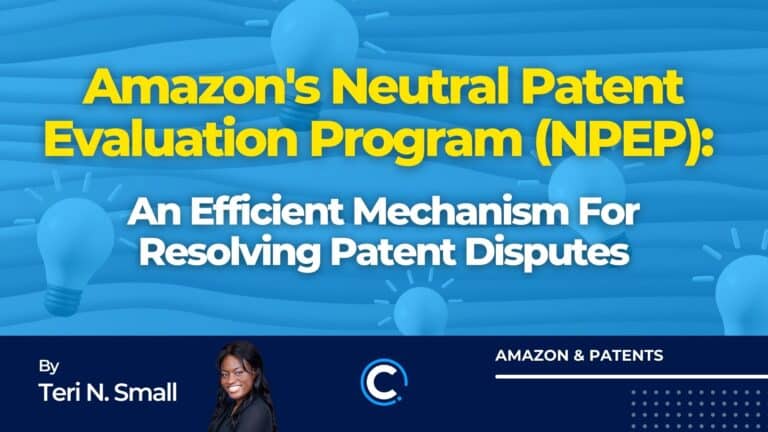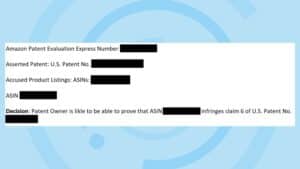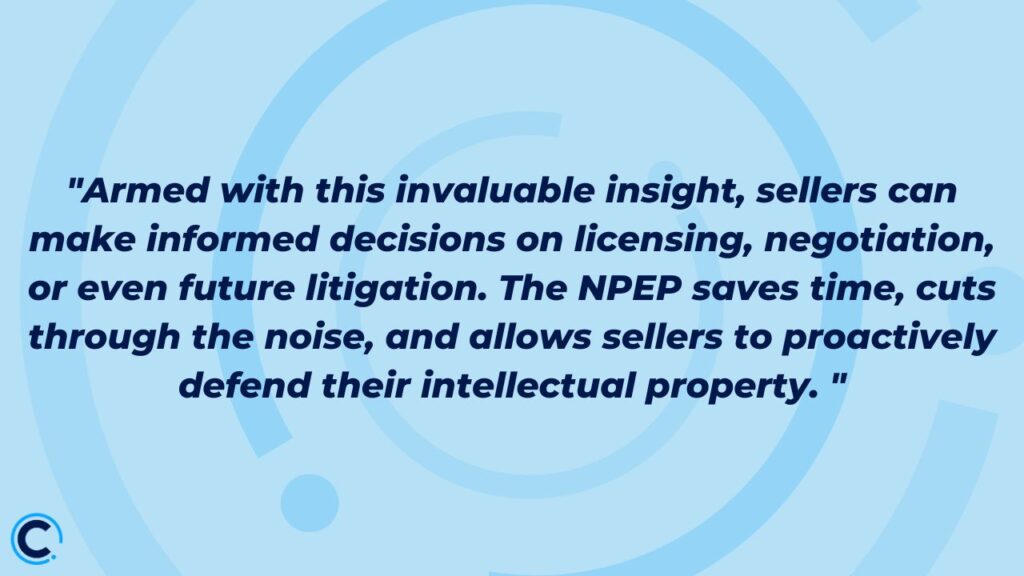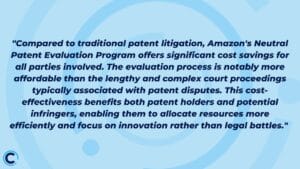
Table of Contents
In the ever-evolving world of intellectual property, Amazon has taken a step forward to address the costly and time-consuming patent dispute resolution process. The Neutral Patent Evaluation Program (NPEP), also known as The Amazon Patent Evaluation Express (APEX), has emerged as a valuable mechanism for resolving patent disputes involving utility patents efficiently, reducing uncertainty, and speeding up enforcement processes. By providing a neutral evaluation by patent experts, the NPEP offers an alternative to traditional litigation, saving both time and resources for patent holders and potential infringers. In this article, we delve into the key aspects of Amazon’s NPEP and discuss why it matters to sellers.

Overview of Amazon’s neutral patent evaluation program
The NPEP offers for verified accounts a streamlined process that enables patent holders to present their cases and fight infringers. The following process, led by independent patent attorneys, aims to reduce the need for lengthy court proceedings, which can be time-consuming and expensive.
Initiation of the NPEP process:
The NPEP process begins when a rights owner submits a request to Amazon to participate in the program and to enforce its patent against a certain listing. This request typically includes relevant information such as patent numbers, claim charts, and details of alleged infringement on that listing. Amazon then contacts the seller with the accusation. The seller has 21 days to either remove their product from the platform or participate in the evaluation process.
Evaluation assignment:
If the seller chooses to participate, Amazon assigns an independent patent attorney or expert to evaluate the patent dispute. These evaluators are professionals with expertise in the relevant technical field and possess the necessary qualifications to assess patent validity and infringement claims.
Fees:
All parties involved in the case are required to pay an agreed fee of $4,000. This fee is paid to the evaluator. The “loser pays” principle applies, meaning that the party that does not prevail in the evaluation will bear the cost of the evaluation fee, and the winner’s $4000 are reimbursed. This fee arrangement is intended to discourage frivolous claims.
Documentation and submissions:
The parties involved provide their legal arguments and supporting documentation within weeks of initiating the NPEP. The supporting documentation may include claim charts, technical specifications, prior art references, and any other relevant evidence. This information helps the evaluator gain a comprehensive understanding of the case and aids in their analysis.
Evaluation process:
The evaluator conducts a thorough review of the submitted documentation and assesses the infringement claims. Upon completion of the evaluation, the independent evaluator prepares a report outlining their findings and conclusions. The report typically includes an assessment of patent validity, analysis of likelihood of infringement claims, and any other pertinent observations or recommendations. This process is typically completed within 2 months of initiating the NPEP process.
Outcome:
If the evaluator decides that the product is likely to infringe the patent, Amazon will remove the product from its platform. If the evaluator decides that the product is not likely to infringe, the product can continue to be sold on Amazon. At this point, Amazon has not indicated if there will be an appeal process to the determination made by the independent evaluator. However, a rights owner can still file a lawsuit to stop infringement, notwithstanding the outcome of the NPEP process.
Why sellers/rights owners should Care about the neutral patent evaluation program?
One of the primary reasons sellers should care about Amazon’s NPEP is the expedited enforcement process it provides. Instead of waiting for extended periods for court proceedings to conclude, patent holders can avail themselves of the NPEP to swiftly resolve disputes. This allows them to protect their intellectual property rights and enforce their patents in a timely manner. Sellers may obtain a neutral evaluation from independent patent attorneys who assess the infringement claims of your patent. Armed with this invaluable insight, sellers can make informed decisions on licensing, negotiation, or even future litigation. The NPEP saves time, cuts through the noise, and allows sellers to proactively defend their intellectual property.

The NPEP also provides Sellers the opportunity to defend themselves against allegations of infringement by arguing noninfringement and invalidity. This means that sellers can present evidence and arguments showing how their product fails to meet the elements of the patent in question, and challenging the validity of the patent. The ability to assert invalidity as a defense adds an essential layer of balance and fairness to the evaluation process, ensuring that patent disputes on Amazon are resolved in a just and equitable manner. By having this option, sellers are granted a fair chance to protect their interests and defend themselves against potential false complaints.
It’s important to note that sellers do not need to use the Amazon NPEP to resolve patent disputes. They can file a regular patent complaint through Amazon if they choose to do so. The decision to use the NPEP is ultimately up to the seller and depends on their specific circumstances and preferences. Nonetheless, the NPEP offers a valuable alternative for resolving patent disputes with potentially more expertise and neutrality, making it an appealing option for sellers seeking a smoother resolution process.
Long story short
Compared to traditional patent litigation, Amazon’s Neutral Patent Evaluation Program offers significant cost savings for all parties involved. The evaluation process is notably more affordable than the lengthy and complex court proceedings typically associated with patent disputes. This cost-effectiveness benefits both patent holders and potential infringers, enabling them to allocate resources more efficiently and focus on innovation rather than legal battles.

In the age-old battle between patent holders and potential infringers, Amazon’s NPEP emerges as a formidable peacemaker, bridging the divide and offering a fair playing field for all parties involved. The program revolutionizes the patent dispute landscape within Amazon, replacing the burdensome and costly litigation process, with an efficient, cost-effective, and transparent alternative.
Furthermore, the Amazon NPEP enhances transparency in patent enforcement and dispute resolution within Amazon’s ecosystem. The involvement of independent patent attorneys in evaluating the patents’ technical aspects, instead of non-technical Amazon employees, mitigates perceived biases and increases overall credibility. This transparency and credibility contribute to a more robust patent system, fostering trust and confidence among sellers.
Conclusion
Amazon’s Neutral Patent Evaluation Program offers a valuable alternative for resolving patent disputes. The NPEP empowers Sellers/ Rights Owners to protect their intellectual property swiftly, while offering a mechanism for defending against infringement allegations in a fair and transparent evaluation process. By streamlining the enforcement process, providing independent expert evaluation, and reducing costs, the NPEP contributes to faster and more efficient dispute resolution within Amazon’s ecosystem.

